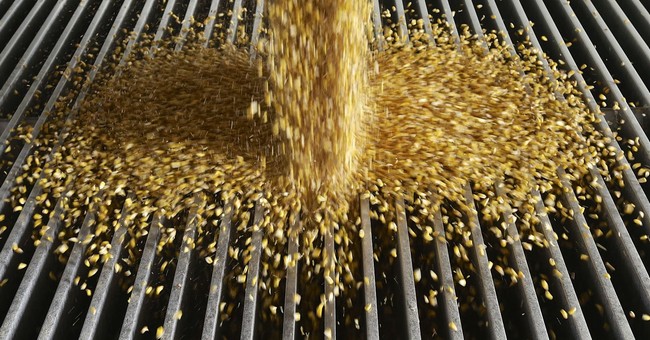
Posted on 03/05/2020 7:53:06 AM PST by Kaslin

In the classic children’s book, If You Give a Mouse a Cookie, a boy gives a mouse a cookie, and then the mouse asks for a glass of milk to wash it down. Then a straw for the milk. Then a napkin… and so on and so on.
Washington, D.C. has its own version called: If You Give a Company a Handout.
Exhibit A is the federal government’s coddling of the biofuels industry. The government has propped up the biofuels market, primarily corn ethanol, through targeted tax credits, government-backed loan guarantees and an outright mandate that forces ethanol into our gas tanks regardless of what the market will bear.
Economically, the biofuels’ addiction to preferential treatment has harmed households and businesses. Prices are 6 to 9 cents per gallon higher than they otherwise would be as refiners pass the costs of blending pricier biofuels onto captive drivers. For the average American using more than 600 gallons per year and the average household spending about $2,000 per year on gasoline, those pennies add up quickly.
Environmentally, the story isn’t much better. Eager to take advantage of the increasing volumes of government-mandated corn, farmers converted more than 1.5 million acres of grassland, forests and wetlands to cropland when the production quotas kicked into gear.
America’s biofuels policy is a classic case of concentrated benefits and dispersed costs. This holds true even among the agricultural community who purportedly stand to gain from the federal government’s push to boost biofuel production. While the mandate may be good for the corn (and soybean) farmers, the higher process for those commodities isn’t so good if you’re a farmer raising chickens, cattle, turkeys, and other livestock and depend on corn as a staple feedstock.
Despite an eclectic mix of economists, environmentalists and anti-hunger activists deriding biofuel subsidies, the U.S. Department of Agricultural is pushing the chips all in on the federal government’s bio-foolishness.
USDA Secretary Sonny Perdue recently announced a new innovation agenda to ostensibly help farmers, consumers and the environment. Included is a target of having biofuels make up 30 percent of U.S. transportation fuels by 2050. According to the U.S. Energy Information Administration (EIA), biofuels accounted for only 5 percent (4 percent ethanol, 1 percent biodiesel) of total transportation fuel use in 2018.
Keep in mind, those volumes are with having government guaranteed mandate in place for more than a decade. If the federal government continues down this path, it will exacerbate the financial burden on households, the environmental toll caused by the policy, and the harm incurred by the majority of the agricultural community the administration is so hell-bent on helping.
Oddly enough, the USDA’s innovation agenda is aiming to “[a]chieve market-driven demand for biomass and biodiesel.” If that’s the case, the government should get out of the way and let the market dictate what the demand for biofuels truly is. If consumer demand drives biofuels to become 30 percent of the market by 2050, great. We won’t need a government program to make it happen. If an undistorted energy market only dictates that we use 8 percent biofuels, so be it.
Drivers will be best served when companies are fighting for a customer’s business without any special help from Washington. This holds true for biofuels, electric vehicles, oil or natural gas.
As the old adage goes, it’s difficult to make predictions, especially about the future. Congress first passed the biofuels mandate in 2005 and expanded it in 2007. A primary goal was to reduce dependence on foreign oil. The EIA’s 2006 Annual Energy Outlook projected domestic oil production to be 5.6 million barrels per day in 2020, dwindling to 4.6 million barrels per day in 2030. Then the shale revolution happened and fundamentally changed the domestic and global energy landscape.
In November 2019, U.S. supply nearly hit 13 million barrels. America’s energy boom has done so much more over the past decade to provide a home-sourced reliable transportation fuel than the federal government’s push for biofuels.
But the real moral of the story is that energy markets are unpredictable. Just as it was unwise for policymakers to think they knew what 2020 would hold in 2005, it’s unwise for the USDA to assume a transportation fuel market comprised of 30 percent biofuels in 2050 will somehow magically be good for families and businesses.
If past is prologue, however, more government intervention in the transportation fuels sector is only going to make things worse.
Yah, well, I can’t afford to eat beef any longer.
Disclaimer: Opinions posted on Free Republic are those of the individual posters and do not necessarily represent the opinion of Free Republic or its management. All materials posted herein are protected by copyright law and the exemption for fair use of copyrighted works.